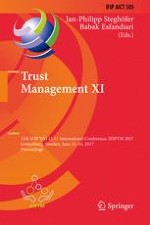2017 | OriginalPaper | Buchkapitel
Self-trust, Self-efficacy and Digital Learning
verfasst von : Natasha Dwyer, Stephen Marsh
Erschienen in: Trust Management XI
Aktivieren Sie unsere intelligente Suche, um passende Fachinhalte oder Patente zu finden.
Wählen Sie Textabschnitte aus um mit Künstlicher Intelligenz passenden Patente zu finden. powered by
Markieren Sie Textabschnitte, um KI-gestützt weitere passende Inhalte zu finden. powered by
